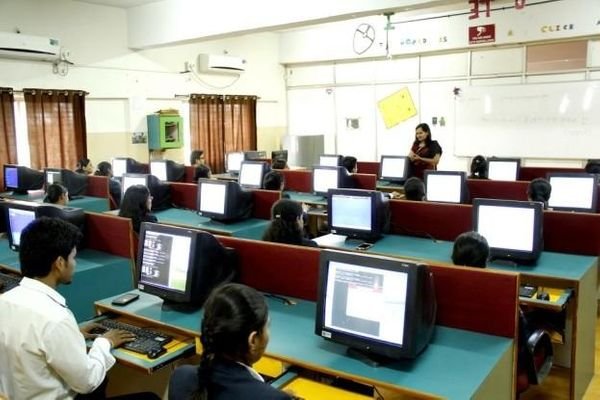JSPM Narhe Technical Campus, Narhe, Pune
Accredited by NAAC With an 'A' Grade
Institute Code : 6755
S No 12-1-2 and 12-2-2 Narhe, Taluka- Haveli, Near Sanas Crane, Pune-Bangalore Highway, Pune, Maharashtra 411041
Landmark: Navale Bridge, Behind Swami-narayan Temple Narhe
Approved By AICTE & Affiliated To Savitribai Phule Pune University.
Master of Business Administration
The Department of Master of Business Administration (MBA) has gone through various dimensions with changes as per the requirements.MBA is a two years full time programme with specializations in Finance Management, Marketing Management, Human Resources Management, International Business Management, Information technology Management, Operations Management, Supply Chain Management, Rural and Agri business management, family business management, Technology Management. The Department is known for curriculum delivery in innovative pedagogy and research based learning. It is an unique feature of the Department that students participate in teaching-learning process through innovative modes. The students are admitted through Common Admission Programme (CAP) of Directorate of Technical Education (DTE) of the State Government. The Department has credibility in building competent Managers and Entrepreneurs in the society. The work of the Department in the field of extension services particularly in Entrepreneurship Development, care towards society, personal growth is noticeable.
Counselling to students is noteworthy. Students and faculty participate in various skills developing activities .Curricular and academic development programmes is at par at its best level which is one facet of the Department.
JSPM NTC MBA department came across a challenge of rendering practical knowledge which was limited because of classroom teaching pedagogy. To match with the global market demand a need to impart practical knowledge for the same rose. This issue led to the brainstorming session amongst the department head and management. After some long discussions in the meetings, emerged the concept of Practical labs in management department. This concept is one of its first unique concepts to be established in Institute. The idea behind creating such labs is to train the students about current trends in corporate world along with preparing them for the corporate needs. This will help to bridge the gap between educational outcome and industrial requirement of intellectual capital. The labs to be established comprises of Finance and Marketing Lab by the name “Space with D2” where one D represents Mr.C.D.Deshmukh (First RBI Governor for Government of India) and second D represents Prof.Peter Drucker (Founder of modern Management and Marketing management Consultant).In this Lab the students will come across finance and marketing aspect and will equip themselves with practical know how of the concerned discipline. Adding another feather to the development of the lab is the establishment of Human Resource Management and Personality Development Lab by the name “Mind Tree”. In this lab the students will learn the techniques to self groom and rebuild their image and confidence through learning and practically practicing required skills for self development and image. Along with self image building the student will also learn the corporate managerial operative functions to be carried out. Such simulation labs will definitely close the gap between the student awareness for the current requirement from the industry and their level of preparation for the same. The students will get a corporate feel and they will learn established concepts and will attempt to develop new ideas, process, thought process, confidence, professional attire, ethics and attitude. The achievement of JSPM NTC department will arise at a much needed greater pace and the outcomes of these labs will be young dynamic managers and entrepreneurs.
Vission
To inculcate business ethical values in youth force, in order to excel their professional career through appropriate management skills.
Mission
To endow, foster and sustain managerial, entrepreneurial and research skills for aspiring students, thereby enabling them to imply honest and right values for facing the global world.
Specializations
Guidelines for Choice of Specialization:
Elective courses (2, 3, 2 each in semester II, III, IV respectively). In this case he /she shall be awarded MBA
specialization and 2 Subject Core courses and 2 Subject Elective courses of Minor specialization. In this case he /she shall be awarded MBA (Functional Area Specialization Major + Functional Area Specialization Minor) degree, e.g. MBA (Marketing + Finance), etc.
Specializations
The following specializations shall be offered as MAJOR / MINOR:
The following specializations shall be offered ONLY as MINOR Specializations:
Summer Internship Project
At the end of Second Semester each student shall undertake a Summer Internship Project (SIP) for 8 weeks. It is mandatory for the student to seek advance written approval from the faculty guide and the Director of the Institute about the topic and organization before commencing the SIP. The SIP may or may not have a Functional Focus, i.e. the student may take up a SIP in his/her intended area of specialization or in any other functional area of management. Ideally the SIP should exhibit a cross-functional orientation.
The student shall submit a written structured report based on work done during this period on the basis of suggested guidelines and research methodology.
SIP may be a research project – based on primary/ secondary data or may be an operational assignment involving working by the student on a given task/assignment/project/ etc. in an organization / industry. It is expected that the SIP shall sensitize the students to the demands of the workplace. The learning outcomes and utility to the organization must be specifically highlighted.
Report Format
The report should be well documented and supported by:
Executive Summary
Chapter 1. Introduction
Chapter 2. Objectives of the Study.
Chapter 3. Company/ Organization profile (including Organization Chart).
Chapter 4. Research Methodology (Statement of Problem, Hypothesis (if any), Research Design.
Chapter 5. Data analysis, Data Interpretation.
Chapter 6. Relevant activity charts, tables, graphs, diagrams, etc. (Optional)
Chapter 7. Findings
Chapter 8. Suggestions & Recommendations.
Chapter 9. Conclusions.
Bibliography (References in appropriate referencing styles – Use Harvard Style of referencing check here)
Appendix (Questionnaire, Data Sheets etc.)
Copies
The student shall submit TWO hard copies & one soft copy (CD) of the project report before 30th September in Semester III. One hard copy is to be returned to the student by the Institute after the External Viva-Voce.
Viva Voce
The Institute shall conduct an internal viva-voce for evaluation of the SIP for 50 marks. The Panel shall comprise of the Internal Faculty Guide & One additional faculty nominated by the Director.
There shall be an external viva-voce for the SIP for 50 marks. The examiner’s panel for the same shall include one external faculty member nominated by the University and one internal faculty member nominated by the Director. The external viva-voce shall be conducted for 15 minutes at least per student.
The Internal & the External viva-voce shall evaluate the project based on:
1. Actual work undertaken by the student
2. Student’s understanding of the organization and business environment
3. Outcome of the project
4. Utility of the project to the organization
5. Basic analytical capabilities

Marketing and Finance (Space with D2) Lab
JSPM NTC MBA department came across a challenge of rendering practical knowledge which was limited because of classroom teachin ...
Read More
HR and PD (Mind Tree) Lab
Adding another feather to the development of the lab is the establishment of Human Resource Management and Personality Developm ...
Read More
Corporate Office Lab
Companies generally operate as sole proprietorships, partnerships, limited liability companies or corporations. Each business e ...
Read More
Computer Lab
Technology has struggled to find its way into the classroom in all sorts of ways, from projectors and televisions to computer l ...
Read MoreProgram Educational Objectives (PEO)
| Programme Educational Objectives (PEOs) | |
|---|---|
| PEO1 | Graduates of the MBA program will successfully integrate core, cross-functional and inter-disciplinary aspects of management theories, models and frameworks with the real world practices and the sector specific nuances to provide solutions to real world business, policy and social issues in a dynamic and complex world. |
| PEO2 | Graduates of the MBA program will possess excellent communication skills, excel in cross-functional, multi-disciplinary, multi-cultural teams, and have an appreciation for local, domestic and global contexts so as to manage continuity, change, risk, ambiguity and complexity |
| PEO3 | Graduates of the MBA program will be appreciative of the significance of Indian ethos and values in managerial decision making and exhibit value centered leadership |
| PEO4 | Graduates of the MBA program will be ready to engage in successful career pursuits covering a broad spectrum of areas in corporate, non-profit organizations, public policy, entrepreneurial ventures and engage in life-long learning |
| PEO5 | Graduates of the MBA program will be recognized in their chosen fields for their managerial competence, creativity & innovation, integrity & sensitivity to local and global issues of social relevance and earn the trust & respect of others as inspiring, effective and ethical leaders, managers, entrepreneurs, intrapreneurs and change agents. |
Program Specific Objectives (PSO)
PSO1 Students obtain relevant interdisciplinary knowledge of accounting, finance, marketing, HRM and become successful and trained professional with excellence in overall skills set
PSO2 With acquired skills set, student will be fit in job industry or can start its own business or research and consultancy firm for changing business environment
Program Outcomes (PO)
| Sr. No. | Programme Outcome |
|---|---|
| PO1 | Generic and Domain Knowledge - Ability to articulate, illustrate, analyze, synthesize and apply the knowledge of principles and frameworks of management and allied domains to the solutions of real-world complex business issues |
| PO2 | Problem Solving & Innovation - Ability to Identify, formulate and provide innovative solution frameworks to real world complex business and social problems by systematically applying modern quantitative and qualitative problem solving tools and techniques. |
| PO3 | Critical Thinking - Ability to conduct investigation of multidimensional business problems using research based knowledge and research methods to arrive at data driven decisions |
| PO4 | Effective Communication - Ability to effectively communicate in cross-cultural settings, in technology mediated environments, especially in the business context and with society at large |
| PO5 | Leadership and Team Work - Ability to collaborate in an organizational context and across organizational boundaries and lead themselves and others in the achievement of organizational goals and optimize outcomes for all stakeholders. |
| PO6 | Global Orientation and Cross-Cultural Appreciation- Ability to approach any relevant business issues from a global perspective andexhibit an appreciation of Cross Cultural aspects of business and management. |
| PO7 | Entrepreneurship - Ability to identify entrepreneurial opportunities and leverage managerial & leadership skills for founding, leading & managing startups as well as professionalizing and growing family businesses. |
| PO8 | Environment and Sustainability - Ability to demonstrate knowledge of and need for sustainable development and assess the impact of managerial decisions and business priorities on the societal, economic and environmental aspects. |
| PO9 | Social Responsiveness and Ethics - Ability to exhibit a broad appreciation of the ethical and value underpinnings of managerial choices in a political, cross-cultural, globalized, digitized, socio-economic environment and distinguish between ethical and unethical behaviors & act with integrity. |
| PO10 | Life Long Learning – Ability to operate independently in new environment, acquire new knowledge and skills and assimilate them into the internalized knowledge and skills. |
Course Outcomes(COs)
.png)
.png)
Prof. Jayant Bhalchandra Kulkarni
DeanMCA, MBA(Marketing) ,Ph.D (Pursuing)
kulkarni.jayant09@gmail.com
Prof. Pratibha Amrut Rasal
Assistant ProfessorMBA (HR) ,Ph.D (Pursuing)
rasalpratibha@gmail.com
Prof. Sandeep Shivaji Salunkhe
Assistant ProfessorMBA(Marketing) ,Ph.D (Pursuing)
sandeep.salunkhe27@gmail.com
Prof. Priyanka Kabir Shinde
Assistant ProfessorMBA (OSCM)
priyankashinde056@gmail.com
Prof. Ashwini Udhav Madane
Assistant ProfessorMBA (Marketing)
ashwinimadane44@gmail.com
Prof. Shradha Sunil Joshi
Assistant ProfessorMBA (Marketing), Ph.D (Pursuing)
shraddha.sunil.joshi@gmail.com
Prof. Vidhyadevi Vijay Shingade
Assistant ProfessorMBA (Finance)
vidhyadevi1976@gmail.com
Mr. Dr. Meghraj Balasaheb Barbole
Assistant ProfessorMBA (Finance & Marketing),PHD
barbole.meghraj@gmail.com
Mr. Mr. Dr. Shailesh Rajhans
Assistant ProfessorMBA(Finance), PHD
shailesh.rajhans1984@gmail.com